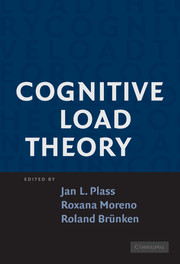Book contents
- Frontmatter
- Contents
- Contributors
- COGNITIVE LOAD THEORY
- Introduction
- PART ONE THEORY
- 1 Cognitive Load Theory: Historical Development and Relation to Other Theories
- 2 Cognitive Load Theory: Recent Theoretical Advances
- 3 Schema Acquisition and Sources of Cognitive Load
- 4 Individual Differences and Cognitive Load Theory
- PART TWO EMPIRICAL EVIDENCE
- PART THREE DISCUSSION
- Index
- References
1 - Cognitive Load Theory: Historical Development and Relation to Other Theories
Published online by Cambridge University Press: 05 June 2012
- Frontmatter
- Contents
- Contributors
- COGNITIVE LOAD THEORY
- Introduction
- PART ONE THEORY
- 1 Cognitive Load Theory: Historical Development and Relation to Other Theories
- 2 Cognitive Load Theory: Recent Theoretical Advances
- 3 Schema Acquisition and Sources of Cognitive Load
- 4 Individual Differences and Cognitive Load Theory
- PART TWO EMPIRICAL EVIDENCE
- PART THREE DISCUSSION
- Index
- References
Summary
The goal of this introductory chapter is to provide a historical review of the assumptions underlying Cognitive Load Theory (CLT) and to place the theory into the broader context of the learning sciences. The chapter focuses on the theoretical developments that guided the research on cognitive load and learning for the past twenty years and is organized in the following way. First, we examine the nature of the cognitive load construct and compare it to similar psychological constructs. Second, we present a historical review of the development of CLT's assumptions in the following four stages: (a) extraneous cognitive load in problem solving, (b) intrinsic cognitive load and the first additivity hypothesis, (c) germane cognitive load and the second additivity hypothesis, and (d) the evolutionary interpretation of CLT. Finally, we conclude the chapter by examining the constructs and assumptions of CLT in relation to other theories in psychology and education.
THE COGNITIVE LOAD CONSTRUCT
CLT is a psychological theory because it attempts to explain psychological or behavioral phenomena resulting from instruction. Psychological theories are concerned with the possible relationships among psychological constructs or between a psychological construct and an observable phenomenon of practical consequence. A psychological construct is an attribute or skill that happens in the human brain. In CLT, the main constructs of interest are cognitive load, hence the name of the theory, and learning. CLT was developed to explain the effects of instructional design on these two constructs.
Information
- Type
- Chapter
- Information
- Cognitive Load Theory , pp. 9 - 28Publisher: Cambridge University PressPrint publication year: 2010
References
Accessibility standard: Unknown
Why this information is here
This section outlines the accessibility features of this content - including support for screen readers, full keyboard navigation and high-contrast display options. This may not be relevant for you.Accessibility Information
- 96
- Cited by
